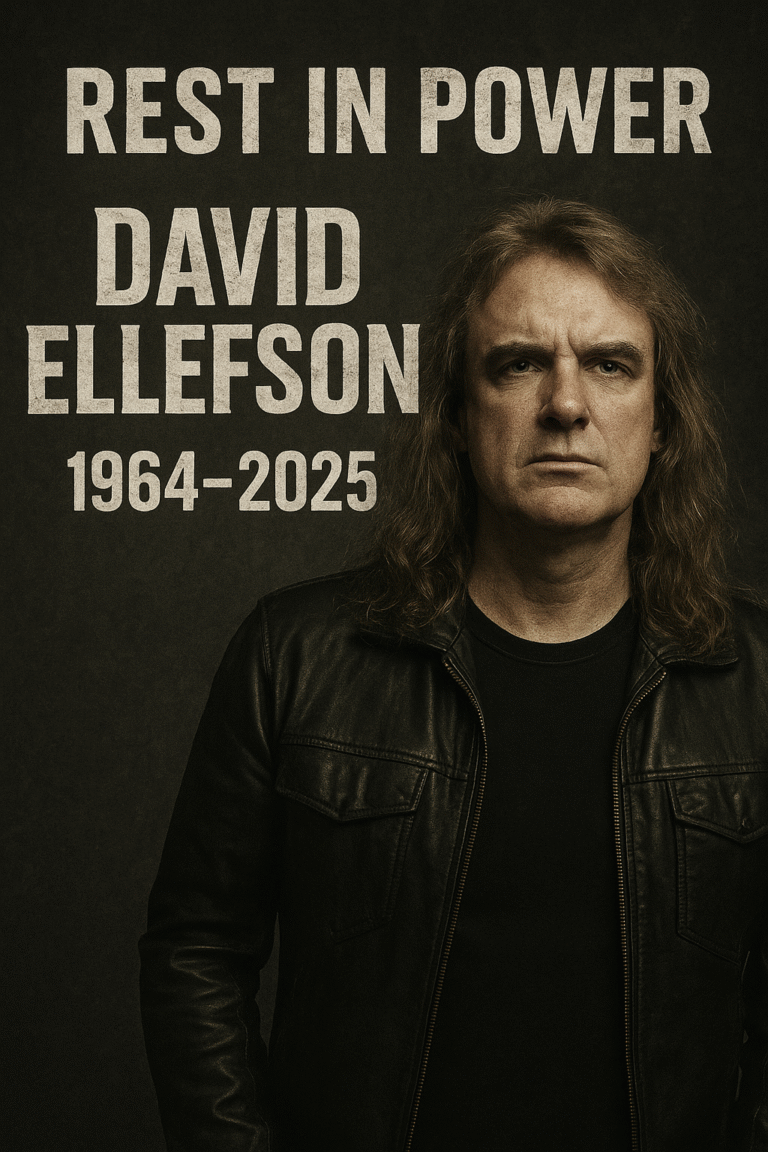Former Megadeth Bassist David Ellefson Passed On
The heavy metal world has been shaken by heartbreaking news: David Ellefson, the former bassist and co-founder of Megadeth, has passed away. At the age of 59, Ellefson’s death marks the end of a remarkable chapter in metal history. Fans across the globe are mourning not only a musician but also a man whose presence shaped the sound and legacy of one of the most influential metal bands of all time.
A Founding Force in Metal
David Ellefson was born on November 12, 1964, in Jackson, Minnesota. In the early 1980s, he moved to Los Angeles to pursue his musical dreams, where fate introduced him to Dave Mustaine, then fresh out of Metallica. Together, the two musicians formed Megadeth in 1983—a band that would go on to define the thrash metal era alongside the likes of Metallica, Slayer, and Anthrax.
As the band’s bassist, Ellefson anchored Megadeth’s sound with precision and intensity. His sharp, driving bass lines provided the backbone to tracks that have become legendary, including “Peace Sells,” “Holy Wars…The Punishment Due,” and “Symphony of Destruction.” Fans and critics alike praised his technical ability, his stage presence, and his chemistry with Mustaine.
Turbulence and Triumph
Ellefson’s career was not without turbulence. In 2002, after years of grueling touring and internal disputes, Megadeth temporarily disbanded. When the band re-formed in 2004, Ellefson did not initially return, citing disagreements with Mustaine. For several years, he pursued other musical projects, including forming the band F5 and working as a producer and entrepreneur in the music industry.
In 2010, however, Ellefson rejoined Megadeth, marking a powerful reconciliation with Mustaine. The reunion was celebrated by fans who cherished his role as a foundational part of the band’s sound. He played on several later Megadeth albums, including Dystopia (2016), which went on to win the band their first-ever Grammy Award.
Beyond Megadeth
Although he will forever be linked to Megadeth, Ellefson’s contributions to music extended far beyond the band. He became a respected figure in the wider rock and metal community, collaborating with numerous artists and embracing opportunities to nurture new talent. Through his record label, Ellefson Music Productions, and his coffee company, Ellefson Coffee Co., he combined his love for music and entrepreneurship in creative ways.
Ellefson also ventured into writing, co-authoring memoirs and music-related works that gave fans a candid look at the struggles and triumphs of life in a world-famous metal band. His openness about his battles with addiction and his path to recovery inspired countless fans who faced similar struggles.
A Controversial Exit
In 2021, Ellefson’s long relationship with Megadeth came to an abrupt end after allegations and controversies surrounding his private life surfaced online. The fallout led to his dismissal from the band, a decision that divided fans but also underscored the complexities of maintaining personal and professional boundaries in the digital age. Despite the controversy, Ellefson remained active musically, joining forces with new collaborators and continuing to perform.
Tributes Pour In
News of Ellefson’s passing has sparked an outpouring of grief and remembrance across the music world. Fellow musicians, fans, and industry peers have taken to social media to share their condolences and memories.
Dave Mustaine, his longtime bandmate and sometimes rival, posted a heartfelt tribute:
“Today I lost a brother. David Ellefson was more than just a bassist—he was a partner in the dream that became Megadeth. We had our differences, but we also shared a bond that can never be broken. Rest in peace, my friend.”
Fans worldwide echoed similar sentiments, remembering Ellefson not only for his musical brilliance but also for his kindness and down-to-earth personality.
A Lasting Legacy
Ellefson’s death leaves a void in the metal community, but his legacy is undeniable. He was part of a movement that redefined heavy metal in the 1980s and carried it into the 21st century with unrelenting power. His playing influenced generations of bassists who looked up to his style, his tone, and his relentless pursuit of excellence.
For many, David Ellefson embodied the spirit of thrash metal: fast, aggressive, uncompromising, yet deeply human. His life was marked by high triumphs and deep challenges, but through it all, he remained a figure of perseverance and creativity.
Conclusion
The passing of David Ellefson is more than just the loss of a musician; it is the closing of a chapter in the history of heavy metal. His journey, from a small-town boy in Minnesota to the global stages of metal’s biggest arenas, is a story of talent, resilience, and impact. Though he is gone, his music will continue to roar through speakers, inspire new generations, and remind the world why Megadeth—and thrash metal itself—still matters.
As fans light candles, play Peace Sells on repeat, and remember the man who stood tall behind his bass, one thing is certain: David Ellefson’s name will live on in heavy metal eternity.
